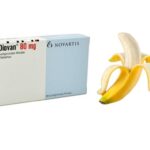Can I Eat Bananas While Taking Spironolactone?

Bananas are most commonly known for being a good source of potassium, but as per the U.S. Department of Agriculture’s MyPlate guidelines, their nutritional worth doesn’t end there. In fact, this fruit is packed with a plethora of vitamins and minerals that are essential to your health, making them one of the world’s most appealing superfoods.
According to U.S. Department of Agriculture (USDA) calculations, which are based on a 2,000-calorie diet, a medium-size banana contains only 105 calories. Although it seems obvious that these fruits are a relatively healthy snack, they get a bad reputation because of the large amount of carbohydrates they have: 27 grams (g) for a medium-sized banana.
Bananas are a great food to eat when you’re sick. They’re soft and bland but rich in nutrients and fast-acting carbs. The potassium in bananas can help replenish your electrolyte stores as well since potassium is one of the key electrolytes your body needs.
What is Spironolactone used for?
Spironolactone oral tablets are a prescription medication. Spironolactone oral tablets contain the active drug spironolactone. They’re a diuretic medication. Diuretics are sometimes called water pills. They help your body to get rid of excess fluid through your urine.
Specifically, spironolactone belongs to a class of drugs called aldosterone antagonists. These drugs are also called potassium-sparing diuretics. (A class of drugs is a group of medications that work in a similar way.)
They’re FDA-approved for use in adults to treat certain forms of the following conditions:
• heart failure with reduced ejection fraction (a condition in which the left side of your heart isn’t able to pump out enough blood to meet your body’s needs)
• edema (fluid retention and swelling) in people with certain kidney and liver problems
• primary hyperaldosteronism (a condition in which your adrenal glands make too much of the hormone aldosterone)
• high blood pressure that’s not well-managed by other drugs
Spironolactone oral tablets are used to treat these conditions in certain situations.
Can I Eat Bananas While Taking Spironolactone?
No, avoid eating bananas and other potassium-rich foods while taking spironolactone since the medication is a potassium-sparing diuretic. This action prevents your body from absorbing too much salt and keeps your potassium levels from getting too low.
However, eating bananas on this medication can increase the amount of potassium in your body. If high potassium happens suddenly and you have very high levels, you may feel heart palpitations, shortness of breath, chest pain, nausea, or vomiting. This is a life-threatening condition that requires immediate medical care. If you have these symptoms, call 911 or go to the emergency room.
Other potassium-rich food you should avoid include papaya, cantaloupe, prune juice, honeydew melons, bananas, raisins, mangoes, kiwis, oranges, orange juice, tomatoes, and tomato juice, white and sweet potatoes, asparagus, pumpkin, and Brussels sprouts. Also, avoid salt substitutes that use potassium chloride instead of sodium chloride and low-sodium milk products.
This warning is especially important for people with kidney conditions and advanced kidney disease.
What are the side effects of spironolactone?
Side effects with low-dose spironolactone aren’t as common as with higher doses but can include irregular menstrual cycle (spotting), breast tenderness, thirst, dry mouth, stomach cramps, vomiting, diarrhea, headache, dizziness, increased blood potassium levels, or low blood pressure. Please let your doctor or healthcare provider know if you are taking potassium supplements or have high blood pressure. It is extremely important to avoid pregnancy while using spironolactone as it can cause severe birth defects. Spironolactone may not be a good choice for you if you have kidney problems, or a history of breast cancer, uterine cancer, or ovarian cancer.
Spironolactone may cause other side effects. Call your doctor if you have any unusual problems while you are taking this medication. If you experience a serious side effect, you or your doctor may send a report to the Food and Drug Administration’s (FDA) MedWatch Adverse Event Reporting program online (http://www.fda.gov/Safety/MedWatch) or by phone (1-800-332-1088).





